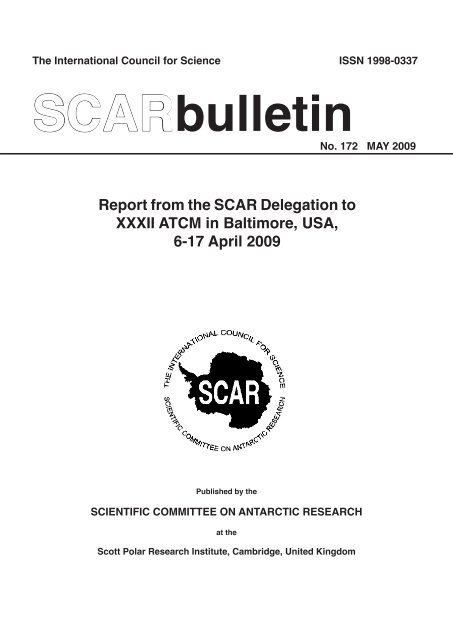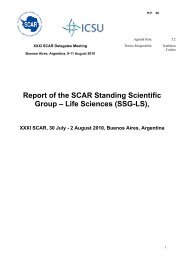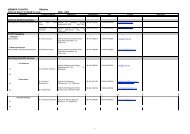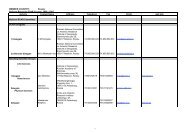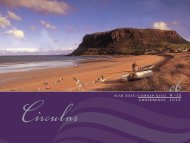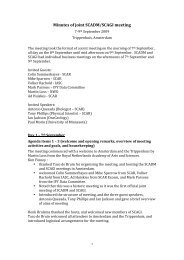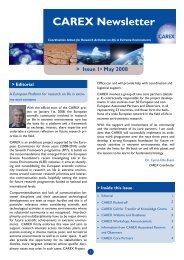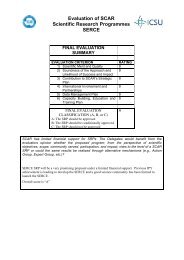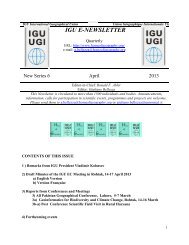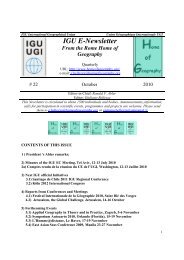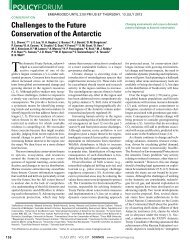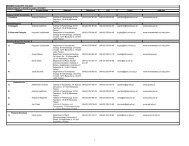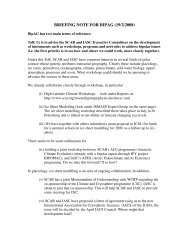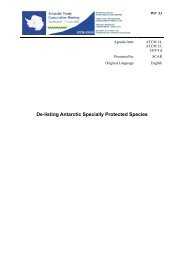Bulletin 172 - Scientific Committee on Antarctic Research
Bulletin 172 - Scientific Committee on Antarctic Research
Bulletin 172 - Scientific Committee on Antarctic Research
Create successful ePaper yourself
Turn your PDF publications into a flip-book with our unique Google optimized e-Paper software.
The Internati<strong>on</strong>al Council for Science ISSN 1998-0337<br />
SCARbulletin<br />
No. <str<strong>on</strong>g>172</str<strong>on</strong>g> MAY 2009<br />
Report from the SCAR Delegati<strong>on</strong> to<br />
XXXII ATCM in Baltimore, USA,<br />
6-17 April 2009<br />
Published by the<br />
SCIENTIFIC COMMITTEE ON ANTARCTIC RESEARCH<br />
at the<br />
Scott Polar <strong>Research</strong> Institute, Cambridge, United Kingdom
SCAR <str<strong>on</strong>g>Bulletin</str<strong>on</strong>g> <str<strong>on</strong>g>172</str<strong>on</strong>g> May 2009<br />
Report from the SCAR Delegati<strong>on</strong> to XXXII ATCM in<br />
Baltimore, USA, 6-17 April 2009<br />
1. Introducti<strong>on</strong><br />
The XXXII <strong>Antarctic</strong> Treaty C<strong>on</strong>sultative Meeting (ATCM) took place in Baltimore,<br />
Maryland, USA, at the Baltimore C<strong>on</strong>venti<strong>on</strong> Centre from 6 th to 17 th April 2009. In<br />
parallel with the start of the <str<strong>on</strong>g>Committee</str<strong>on</strong>g> <strong>on</strong> Envir<strong>on</strong>mental Protecti<strong>on</strong> (CEP) XII in<br />
Baltimore <strong>on</strong> April 6 th , a joint sessi<strong>on</strong> between the <strong>Antarctic</strong> Treaty C<strong>on</strong>sultative<br />
Parties (ATCPs) and the Arctic Council was held at the US State Department in<br />
Washingt<strong>on</strong> DC. US Secretary of State Hilary Clint<strong>on</strong>, and the President of the Arctic<br />
Council addressed the joint meeting. It featured the endorsement of a joint Ministerial<br />
Declarati<strong>on</strong> <strong>on</strong> the Internati<strong>on</strong>al Polar Year 2007-2008 (IPY) (Appendix 1). The<br />
sessi<strong>on</strong> was followed by an afterno<strong>on</strong> presentati<strong>on</strong> <strong>on</strong> the science of IPY by US<br />
scientists at the US Nati<strong>on</strong>al Academy’s headquarters, in Washingt<strong>on</strong>, DC. Videos of<br />
these presentati<strong>on</strong> videos are available at:<br />
http://www.nsf.gov/news/news_summ.jsp?cntn_id=114688.<br />
The SCAR Delegati<strong>on</strong> c<strong>on</strong>sisted of C Summerhayes (Head of Delegati<strong>on</strong>), C<br />
Kennicutt, M Sparrow, and K Lochte, who presented the SCAR lecture. The<br />
Chairman of SCAR’s Standing <str<strong>on</strong>g>Committee</str<strong>on</strong>g> <strong>on</strong> the <strong>Antarctic</strong> Treaty System (SC-ATS),<br />
S Chown, sent his regrets for being unable to attend. Several of the Members of SC-<br />
ATS attended the meeting (C Kennicutt, H Miller, S Marenssi, J Shears), which<br />
facilitated decisi<strong>on</strong> making <strong>on</strong> key issues c<strong>on</strong>cerning SCAR’s presentati<strong>on</strong>s to the<br />
CEP and the ATCM. SCAR Vice-Presidents R Ravindra and S Marenssi were also<br />
present.<br />
2. SCAR Input<br />
SCAR provided <strong>on</strong>e Working Paper and nine Informati<strong>on</strong> Papers (<strong>on</strong>e <strong>on</strong> behalf of<br />
the IPY Internati<strong>on</strong>al Project Office). Papers comprised those dealing with requests<br />
made of SCAR as well as those providing informati<strong>on</strong> to the CEP, specifically:<br />
WP48: IPY Report: Accomplishments and Challenges (prepared by D Carls<strong>on</strong> and C<br />
Summerhayes).<br />
IP 4: SCAR’s envir<strong>on</strong>mental code of c<strong>on</strong>duct for terrestrial scientific field research in<br />
<strong>Antarctic</strong>a<br />
IP 5: SCAR’s <strong>Antarctic</strong> Climate Change and the Envir<strong>on</strong>ment (ACCE) Review<br />
Report<br />
IP 7: SCAR’s Role in the <strong>Antarctic</strong> Treaty System<br />
IP 9: SCAR’s Annual Report 2008 – 2009<br />
IP 10: The IPY Aliens in <strong>Antarctic</strong>a Project (a preliminary view)<br />
IP 55: Improvements to the Alien Species Database (submitted by Australia and<br />
SCAR)<br />
IP 65: Biological prospecting in the <strong>Antarctic</strong>: An update <strong>on</strong> the review by SCAR<br />
1
SCAR <str<strong>on</strong>g>Bulletin</str<strong>on</strong>g> <str<strong>on</strong>g>172</str<strong>on</strong>g> May 2009<br />
IP 69: Persistent Organic Pollutants in the <strong>Antarctic</strong> (prepared by SCAR’s<br />
Envir<strong>on</strong>mental C<strong>on</strong>taminati<strong>on</strong> in <strong>Antarctic</strong>a Acti<strong>on</strong> Group)<br />
IP 71: The SCAR Lecture – Marine Life and Change in the Southern Ocean<br />
The papers are available <strong>on</strong> the SCAR web site:<br />
(http://www.scar.org/treaty/atcmxxxii/)<br />
3. <str<strong>on</strong>g>Committee</str<strong>on</strong>g> <strong>on</strong> Envir<strong>on</strong>mental Protecti<strong>on</strong> XII<br />
3.1 Internati<strong>on</strong>al Polar Year (Also submitted to ATCM)<br />
On behalf of the Internati<strong>on</strong>al Polar Year (IPY) Project Office, SCAR submitted WP<br />
48, reviewing progress. David Carls<strong>on</strong>, Director of the IPY Internati<strong>on</strong>al Programme<br />
Office, presented the IPY paper. In summary he called for a c<strong>on</strong>tinued focus <strong>on</strong> polar<br />
research and polar issues at the highest levels of nati<strong>on</strong>al and internati<strong>on</strong>al science<br />
organisati<strong>on</strong>s; the development of integrated climate–ecosystem–ec<strong>on</strong>omic predicti<strong>on</strong><br />
capabilities for polar regi<strong>on</strong>s and regi<strong>on</strong>al predicti<strong>on</strong> capabilities for specific areas of<br />
the <strong>Antarctic</strong>; identificati<strong>on</strong> of stable l<strong>on</strong>g-term locati<strong>on</strong>s for the many networks and<br />
programmes established during IPY; the provisi<strong>on</strong> of attenti<strong>on</strong> and assistance to the<br />
recruitment and retenti<strong>on</strong> of young polar scientists within nati<strong>on</strong>al research<br />
programmes and to the growing internati<strong>on</strong>al Associati<strong>on</strong> of Polar Early Career<br />
Scientists (APECS); the rapid provisi<strong>on</strong> of IPY data and outcomes as c<strong>on</strong>tributi<strong>on</strong>s to<br />
global and polar-specific integrated assessments; and increased nati<strong>on</strong>al efforts to<br />
preserve, store and exchange reliable, accessible, l<strong>on</strong>g-term IPY data.<br />
SCAR commented that to make sure the IPY legacy works effectively in the<br />
south polar regi<strong>on</strong>, Parties are encouraged to submit data to their nati<strong>on</strong>al<br />
<strong>Antarctic</strong> data centres, and - if they do not have such centres - to establish them;<br />
these centres form part of an internati<strong>on</strong>al network of data and informati<strong>on</strong> exchange<br />
that is coordinated by SCAR through its Standing <str<strong>on</strong>g>Committee</str<strong>on</strong>g> <strong>on</strong> <strong>Antarctic</strong> Data<br />
Management (SC-ADM). Only by sharing data across nati<strong>on</strong>al boundaries will a pan-<br />
<strong>Antarctic</strong> view of how <strong>Antarctic</strong>a works as an integrated comp<strong>on</strong>ent of the Earth<br />
system be attained. IPY also aimed to develop observing systems as a lasting legacy.<br />
In that c<strong>on</strong>text SCAR is developing with SCOR (<str<strong>on</strong>g>Scientific</str<strong>on</strong>g> <str<strong>on</strong>g>Committee</str<strong>on</strong>g> <strong>on</strong> Oceanic<br />
<strong>Research</strong>) the scientific design for a Southern Ocean Observing System (SOOS).<br />
SCAR hopes to bring the design plan for the SOOS to ATCM and CEP in 2010.<br />
Finally SCAR reminded Parties that the sec<strong>on</strong>d IPY science c<strong>on</strong>ference would take<br />
place in Oslo, Norway, in June 2010.<br />
CEP urged parties to c<strong>on</strong>tribute to the IPY legacy.<br />
3.2 Envir<strong>on</strong>mental Domains<br />
New Zealand introduced WP 31, Updated analysis of representati<strong>on</strong> of Annex V<br />
categories and Envir<strong>on</strong>mental Domains in the system of <strong>Antarctic</strong> Specially Protected<br />
and Managed Areas. SCAR noted that it is in the midst of an assessment of the<br />
Envir<strong>on</strong>mental Domains Analysis (EDA), which it plans to present at CEP XIII.<br />
3.3 Marine Protected Areas<br />
The UK introduced WP 34, Spatial protecti<strong>on</strong> and management of <strong>Antarctic</strong> marine<br />
biodiversity (MPAs). SCAR c<strong>on</strong>firmed its willingness to cooperate <strong>on</strong> this issue as<br />
2
SCAR <str<strong>on</strong>g>Bulletin</str<strong>on</strong>g> <str<strong>on</strong>g>172</str<strong>on</strong>g> May 2009<br />
the work progresses (no deadline set, and the work programme will evolve<br />
through negotiati<strong>on</strong>s over time).<br />
3.4 N<strong>on</strong>-Native Species<br />
Australia, France and NZ introduced WP 5, A work programme for CEP acti<strong>on</strong> <strong>on</strong><br />
n<strong>on</strong>-native species. SCAR welcomed the proposed work programme, but pointed out<br />
that during its <strong>on</strong>going evaluati<strong>on</strong> of terrestrial biodiversity - as part of the evaluati<strong>on</strong><br />
of the envir<strong>on</strong>mental domains analysis approach (which will be reported in 2010) - it<br />
has become clear that there are major gaps in our knowledge of terrestrial<br />
biodiversity. Without knowing what is indigenous, identifying n<strong>on</strong>-native species and<br />
their impact will be problematic. The Census of <strong>Antarctic</strong> Marine Life dem<strong>on</strong>strates<br />
how breakthroughs in understanding the nature of biodiversity in the ocean can be<br />
accomplished and a similar effort is needed for terrestrial envir<strong>on</strong>ments. SCAR<br />
volunteered to participate in the Intersessi<strong>on</strong>al C<strong>on</strong>tact Group (ICG) to identify<br />
high-risk areas, and to propose research needs with particular reference to the<br />
lack of knowledge of native species; these efforts are essential to any study of<br />
n<strong>on</strong>-native species. SCAR thanked Australia for hosting the SCAR biodiversity<br />
database, which will be an essential aid in evaluating the distributi<strong>on</strong> of native and<br />
n<strong>on</strong>-native species. CEP welcomed SCAR’s offer.<br />
The UK introduced WP 33, Review of provisi<strong>on</strong>s relating to n<strong>on</strong>-native species<br />
introducti<strong>on</strong>s in ASPA and ASMA management plans. SCAR noted that inter-site<br />
transfer within the <strong>Antarctic</strong> is also a c<strong>on</strong>cern, because of the possibility of genetic<br />
'c<strong>on</strong>taminati<strong>on</strong>' and this impact needs careful c<strong>on</strong>siderati<strong>on</strong>. SCAR offered<br />
assistance subject to negotiati<strong>on</strong> with the authors of the work.<br />
SCAR presented IP 4, SCAR’s envir<strong>on</strong>mental code of c<strong>on</strong>duct for terrestrial scientific<br />
field research in <strong>Antarctic</strong>a, which had been reviewed by SCAR scientists and<br />
COMNAP and endorsed by Delegates at XXX SCAR. SCAR encouraged Parties to<br />
implement the code.<br />
SCAR introduced IP 10, The Aliens in <strong>Antarctic</strong> Project, noting that this was a<br />
preview of <strong>on</strong>ly part of the project, highlighting the work of the Dutch group. SCAR<br />
will provide a comprehensive report <strong>on</strong> the IPY Aliens project to CEP XIII.<br />
Australia and SCAR introduced IP 55, Improvements to the Alien Species Database.<br />
This reminds parties of the need to use the SCAR terrestrial biodiversity database<br />
maintained by the AAD, as a central database for n<strong>on</strong>-native terrestrial species. CEP<br />
encouraged parties to submit data to and use the database.<br />
3.5 Seabirds<br />
ACAP provided WP 30, Standardised methodology for counting southern giant<br />
petrels. SCAR welcomed the informati<strong>on</strong> from ACAP and supported the c<strong>on</strong>tinued<br />
provisi<strong>on</strong> of advice by ACAP.<br />
3.6 <strong>Antarctic</strong> Climate Change and the Envir<strong>on</strong>ment (IP 5) (also given to<br />
ATCM)<br />
SCAR noted that for the past few years it has been providing the ATCM and CEP<br />
with updates <strong>on</strong> the evoluti<strong>on</strong> of the scientific understanding of climate change in the<br />
<strong>Antarctic</strong> and its interacti<strong>on</strong>s with the global climate system. In January 2009<br />
SCAR’s review of the physics of the climate system was published in the journal<br />
3
SCAR <str<strong>on</strong>g>Bulletin</str<strong>on</strong>g> <str<strong>on</strong>g>172</str<strong>on</strong>g> May 2009<br />
Reviews of Geophysics, reflecting SCAR’s desire for peer review of its findings.<br />
SCAR is now adding to that work with an update <strong>on</strong> the physics of the ocean, ice,<br />
atmosphere system and an integrati<strong>on</strong> with knowledge of the changes in the biology<br />
that seem to occur in resp<strong>on</strong>se to climate change in <strong>Antarctic</strong>a and the Southern<br />
Ocean. This review will appear later this year as a book designed to be, in <strong>on</strong>e sense,<br />
an <strong>Antarctic</strong> equivalent of the Arctic Climate Impact Assessment published in 2005.<br />
The draft of the book is out for review by the scientific community so it is a work in<br />
progress subject to c<strong>on</strong>tinuing revisi<strong>on</strong>. However, the executive summary of the book<br />
has been extensively reviewed and is available as paper IP 5. It is likely that this<br />
summary will be improved up<strong>on</strong> as the book is finalized, but SCAR is c<strong>on</strong>fident that<br />
it is a reas<strong>on</strong>able digest of the science at this time. SCAR is preparing the summary<br />
for publicati<strong>on</strong> in the peer-reviewed literature. Once the ACCE book has been<br />
published, SCAR intends to provide the ATCM and CEP with annual updates <strong>on</strong> the<br />
state of the climate and envir<strong>on</strong>ment. SCAR wishes to work closely with others (CEP,<br />
CCAMLR, COMNAP) <strong>on</strong> the producti<strong>on</strong> of those reports. In c<strong>on</strong>clusi<strong>on</strong> SCAR<br />
encouraged Parties to support and foster research <strong>on</strong>: <strong>Antarctic</strong> climate change<br />
focusing <strong>on</strong> those aspects that are least understood (such as models of the behaviour<br />
of the ice sheet, for example) with particular attenti<strong>on</strong> paid to establishing and<br />
sustaining l<strong>on</strong>g-term, interdisciplinary observing projects; the distributi<strong>on</strong> of<br />
terrestrial species and the spatial distributi<strong>on</strong> of genetic diversity especially in rapidly<br />
warming areas; and identifying areas pr<strong>on</strong>e to an elevated risk of biological invasi<strong>on</strong><br />
due to climate change.<br />
The report was very well received. Norway proposed that ATCM c<strong>on</strong>vene a formal<br />
climate change meeting of scientific, government and management experts and<br />
proposed to host such a meeting in Norway in 2010. SCAR was asked to bring<br />
updates <strong>on</strong> <strong>Antarctic</strong> climate change to future CEP meetings, and offered to join<br />
the meeting of experts in 2010.<br />
The UK introduced WP 38, Climate change and the <strong>Antarctic</strong> envir<strong>on</strong>ment:<br />
management implicati<strong>on</strong>s. SCAR offered to provide a review paper by next year<br />
(or two years at latest), in c<strong>on</strong>sultati<strong>on</strong> with other parties, <strong>on</strong> how best to decide<br />
(a) where to c<strong>on</strong>duct climate change m<strong>on</strong>itoring, and (b) what were the most<br />
effective indicators of climate change.<br />
3.7 Data and Informati<strong>on</strong><br />
The UK presented WP 41, Development of envir<strong>on</strong>mental data services to inform the<br />
envir<strong>on</strong>mental impact assessment (EIA). They propose that the CEP work with<br />
SCAR, COMNAP and CCAMLR to facilitate easier access to and ensure better coordinati<strong>on</strong><br />
of envir<strong>on</strong>mental m<strong>on</strong>itoring data and informati<strong>on</strong> for development of<br />
EIAs. This would capitalise <strong>on</strong> SCAR’s <strong>Antarctic</strong> Master Directory and the efforts of<br />
SC-ADM. They suggested that SC-ADM could assist in improving the current system<br />
by:<br />
• enabling analysis of l<strong>on</strong>g-term trends;<br />
• allowing comparis<strong>on</strong> with similar envir<strong>on</strong>mental m<strong>on</strong>itoring data from other sites;<br />
• where appropriate, providing base-line envir<strong>on</strong>mental m<strong>on</strong>itoring data before<br />
activities start;<br />
• encouraging co-ordinated and regular/systematic collecti<strong>on</strong> of envir<strong>on</strong>mental<br />
m<strong>on</strong>itoring data; and<br />
4
SCAR <str<strong>on</strong>g>Bulletin</str<strong>on</strong>g> <str<strong>on</strong>g>172</str<strong>on</strong>g> May 2009<br />
• facilitating closer integrati<strong>on</strong> of informati<strong>on</strong> <strong>on</strong> envir<strong>on</strong>mental m<strong>on</strong>itoring data,<br />
<strong>Antarctic</strong> activities and the EIA process.<br />
CEP requested SCAR to ask SCADM to provide a report for the next meeting <strong>on</strong><br />
how it could assist the <str<strong>on</strong>g>Committee</str<strong>on</strong>g>’s work.<br />
3.8 Persistent Organic Pollutants<br />
SCAR introduced IP 69, Persistent Organic Pollutants in the <strong>Antarctic</strong>: an Update.<br />
SCAR recalled a request made to ATCM by the Stockholm C<strong>on</strong>venti<strong>on</strong> for<br />
informati<strong>on</strong> <strong>on</strong> persistent organic pollutants in the <strong>Antarctic</strong> Treaty Area. SCAR’s<br />
Acti<strong>on</strong> Group <strong>on</strong> Envir<strong>on</strong>mental C<strong>on</strong>taminati<strong>on</strong> in <strong>Antarctic</strong>a (ECA) prepared a<br />
comprehensive report presented as an extended summary in IP 69. The final report is<br />
being edited and will be ready by end April. SCAR agreed to provide the full POPs<br />
report to the CEP Chair as so<strong>on</strong> as it was ready. He will distribute it further.<br />
3.9 CEP and SCAR interacti<strong>on</strong>s<br />
For the first time, the CEP Chair was invited to attend the SCAR Delegates meeting.<br />
H Decleir (Belgium) represented CEP at XXX SCAR and reported <strong>on</strong> his attendance<br />
through WP52. The CEP welcomed this increased cooperati<strong>on</strong> between CEP and<br />
SCAR.<br />
SCAR introduced IP 7, SCAR’s role in the <strong>Antarctic</strong> Treaty System. Over the years<br />
the framework within which SCAR c<strong>on</strong>ducts its Treaty advisory role has become<br />
increasingly complex, with the creati<strong>on</strong> of new organizati<strong>on</strong>s, large increases in the<br />
numbers of nati<strong>on</strong>s participating, and the adopti<strong>on</strong> of various c<strong>on</strong>venti<strong>on</strong>s and legal<br />
instruments. As the <strong>Antarctic</strong> Treaty System has evolved, so has SCAR and its<br />
advisory role. IP 7 is intended to act as a sort of handbook to address possible<br />
misc<strong>on</strong>cepti<strong>on</strong>s about SCAR’s role, and to establish a comm<strong>on</strong> understanding am<strong>on</strong>g<br />
Parties for setting realistic expectati<strong>on</strong>s in relati<strong>on</strong> to SCAR’s role in the <strong>Antarctic</strong><br />
Treaty System. The paper reaffirms SCAR’s commitment to its advisory role, its<br />
independence, and its desire to bring before the Parties the latest and most up to date<br />
scientific informati<strong>on</strong> and knowledge to bear <strong>on</strong> critical issues relating to policy. The<br />
IP also outlines the principles that guide SCAR’s advisory activities:<br />
1) SCAR is committed to giving the best, most accurate and up-to-date<br />
scientific advice.<br />
2) Assessments of scientific data and informati<strong>on</strong> are works in progress and<br />
c<strong>on</strong>clusi<strong>on</strong>s are qualified as being to the "best of our knowledge".<br />
3) SCAR has a yearly obligati<strong>on</strong> to the ATCM to provide new or updated<br />
advice and a “best effort” is the goal within time c<strong>on</strong>straints, but not at the<br />
sacrifice of quality.<br />
4) SCAR primarily relies <strong>on</strong> peer-reviewed, publicly available science and<br />
informati<strong>on</strong> as a quality c<strong>on</strong>trol/quality assurance mechanism.<br />
5) Broad, inclusive, and open c<strong>on</strong>sultati<strong>on</strong> is the basis for producing SCAR<br />
advisory documents.<br />
6) SCAR has ultimate resp<strong>on</strong>sible for the quality and accuracy of its advice,<br />
accepts this resp<strong>on</strong>sibility, and highly values its reputati<strong>on</strong> as an objective,<br />
authoritative and independent source of advice.<br />
5
SCAR <str<strong>on</strong>g>Bulletin</str<strong>on</strong>g> <str<strong>on</strong>g>172</str<strong>on</strong>g> May 2009<br />
SCAR urged parties to examine IP 7 to develop comm<strong>on</strong> and realistic expectati<strong>on</strong>s for<br />
SCAR’s role in the <strong>Antarctic</strong> Treaty System. The CEP welcomed the paper and the<br />
<strong>on</strong>going and developing relati<strong>on</strong>ship between SCAR and the CEP, noting that the<br />
CEP is reliant <strong>on</strong> SCAR for the provisi<strong>on</strong> of high quality and timely scientific advice<br />
that is outside the expertise of the <str<strong>on</strong>g>Committee</str<strong>on</strong>g>.<br />
SCAR requested the CEP Chair, after each meeting, to provide in writing a summary<br />
of the requests made of SCAR by the committee, indicating what was required and by<br />
when.<br />
3.10 Management plans for ASPAs and ASMAs<br />
Off-line SCAR was requested to resume its provisi<strong>on</strong> of advice <strong>on</strong> scientific issues<br />
if at all possible.<br />
4. <strong>Antarctic</strong> Treaty C<strong>on</strong>sultative Meeting<br />
4.1 SCAR Annual Report 2007 – 2008<br />
The SCAR President, Chuck Kennicutt, presented a comprehensive report (IP 9) <strong>on</strong><br />
SCAR’s activities in the inter-sessi<strong>on</strong>al period. SCAR provides the <strong>Antarctic</strong> Treaty<br />
with high quality, independent scientific advice <strong>on</strong> a wide range of issues being<br />
c<strong>on</strong>sidered by the <strong>Antarctic</strong> Treaty Parties. In 2008 SCAR’s nati<strong>on</strong>al membership<br />
grew to 35 with the additi<strong>on</strong> of Romania. SCAR is now legally registered in the UK<br />
as a Charity. Thanks to assistance from the Russian Federati<strong>on</strong>, SCAR organized with<br />
the Internati<strong>on</strong>al Arctic Science <str<strong>on</strong>g>Committee</str<strong>on</strong>g> (IASC), the first Internati<strong>on</strong>al Polar Year<br />
science c<strong>on</strong>ference (St Petersburg, Russia, July 2008). This was the largest polar<br />
science c<strong>on</strong>ference ever, with 1,150 attendees. SCAR c<strong>on</strong>tributed in a leadership role<br />
and through 70 science projects to the Internati<strong>on</strong>al Polar Year, which c<strong>on</strong>cluded <strong>on</strong><br />
March 1, 2009. SCAR is currently undergoing an external review (by a team from the<br />
USA, Italy, Switzerland, UK and Australia) as an aid to the c<strong>on</strong>structi<strong>on</strong> of its sec<strong>on</strong>d<br />
strategic plan (2010-2016). SCAR is now a key partner in a project sp<strong>on</strong>sored by the<br />
Internati<strong>on</strong>al Council for Science (ICSU) to develop a Polar Informati<strong>on</strong> Comm<strong>on</strong>s;<br />
this bipolar approach to data management, involving the World Meteorological<br />
Organisati<strong>on</strong> (WMO) and others, will champi<strong>on</strong> co-operati<strong>on</strong> <strong>on</strong> data access am<strong>on</strong>g<br />
Parties with polar interests. In 2009 SCAR will finalize its Data and Informati<strong>on</strong><br />
Strategy, which will be an important piece of the Polar Comm<strong>on</strong>s initiative. Thanks to<br />
assistance from Italy and Australia, SCAR c<strong>on</strong>tinues to update the SCAR Composite<br />
Gazetteer of <strong>Antarctic</strong>a, now hosted <strong>on</strong> a web site at the Australian <strong>Antarctic</strong> Data<br />
Centre. The Gazetteer is the most complete and updated list of geographical names in<br />
<strong>Antarctic</strong>a including 36006 geographical names corresp<strong>on</strong>ding to 18,209 geographical<br />
features provided by 22 Countries. For the present ATCM and CEP, SCAR has<br />
submitted 1 Working Paper and 9 Informati<strong>on</strong> Papers. Due to the short time between<br />
ATCM’s this last year, SCAR has had to defer submissi<strong>on</strong>s <strong>on</strong> a few items requested<br />
by the CEP during XXXI ATCM, including an evaluati<strong>on</strong> of the envir<strong>on</strong>mental<br />
domains analysis in relati<strong>on</strong> to terrestrial biodiversity, an assessment of c<strong>on</strong>servati<strong>on</strong><br />
planning, a full review of the Aliens in <strong>Antarctic</strong> IPY programme, and an aliens risk<br />
assessment. These will all be available in 2010. SCAR stands ready to assist the<br />
ATCPs as necessary. The report was well received.<br />
6
SCAR <str<strong>on</strong>g>Bulletin</str<strong>on</strong>g> <str<strong>on</strong>g>172</str<strong>on</strong>g> May 2009<br />
4.2 SCAR Lecture – Marine Life and Change in the Southern Ocean<br />
The SCAR lecture, <strong>on</strong> “Marine Life and Change in the Southern Ocean”, and<br />
providing SCAR with an opportunity to highlight the work of EBA, was given by Dr.<br />
Karin Lochte of AWI, and took place between 1200 and 1300 <strong>on</strong> Tuesday April 14 th .<br />
It was very well received. The SCAR Lecture Powerpoint slides will be placed <strong>on</strong><br />
the SCAR web site before the end of April. SCAR was asked to present a lecture to<br />
ATCM XXXIII.<br />
4.3 Bioprospecting<br />
SCAR introduced IP 65, Biological prospecting in the <strong>Antarctic</strong>: an update <strong>on</strong> the<br />
review by SCAR. Owing to incomplete returns of the SCAR questi<strong>on</strong>naire it was not<br />
possible to complete the survey in the short time available since the last CEP meeting.<br />
SCAR was proposing to complete the survey to the extent possible by CEP XIII.<br />
Bioprospecting was c<strong>on</strong>sidered under agenda item 17 in the Instituti<strong>on</strong>al and Legal<br />
Working Group. Four working papers and six informati<strong>on</strong>al papers were c<strong>on</strong>sidered<br />
under this agenda item. The issue of bioprospecting has many facets and resulted in<br />
robust discussi<strong>on</strong>s. Issues are related to definiti<strong>on</strong>s, access to geographical sites and<br />
informati<strong>on</strong>, benefit sharing, and informati<strong>on</strong> reporting. The topic of bioprospecting is<br />
drawing much attenti<strong>on</strong> and it will no doubt take substantial time to resolve a way<br />
forward. There seems to be general agreement that the ATS has the mechanisms and<br />
procedures to deal with bioprospecting. SCAR IP 65 gave an update <strong>on</strong> progress in<br />
reviewing published literature and summarized the results from a survey of the<br />
bioprospecting activities of its members. SCAR noted that disentangling systematic<br />
research from bioprospecting requires c<strong>on</strong>siderati<strong>on</strong> of the systematic literature in<br />
toto; many activities are not comprehensively reported in scientific reports submitted<br />
to SCAR, and much of the initial work in the field is published in local journals that<br />
are frequently more difficult to access than regi<strong>on</strong>al or internati<strong>on</strong>al periodicals. This<br />
has led to the c<strong>on</strong>clusi<strong>on</strong> that a substantially larger group of scientists will need to be<br />
involved if a comprehensive assessment is to be the result. Due to these factors, more<br />
time will be necessary to adequately address the requests by the Treaty Parties.<br />
Presenting a paper at ATCM XXXII would be premature in that it would not be an<br />
accurate reflecti<strong>on</strong> of the range of work published and activities undertaken by SCAR<br />
members. SCAR will c<strong>on</strong>tinue to assess the informati<strong>on</strong> available, as agreed to at<br />
ATCM XXXI providing as comprehensive a resp<strong>on</strong>se as possible by ATCM<br />
XXXIII. SCAR called <strong>on</strong> Parties to encourage their respective communities to<br />
resp<strong>on</strong>d to the SCAR survey so the report next year can provide a complete and<br />
accurate picture of bioprospecting activities in <strong>Antarctic</strong>a.<br />
4.4 Climate Change (also addressed under CEP, above)<br />
Under Agenda item 13 of the ATCM, SCAR reminded Parties of the main findings of<br />
IP 5 (see 3.6 above). It was excepti<strong>on</strong>ally well received, with the US, UK and many<br />
others c<strong>on</strong>gratulating SCAR <strong>on</strong> doing a 'remarkable' piece of work of 'excellent<br />
quality' providing 'extremely important advice' to Treaty Parties (their words in<br />
quotes). SCAR was asked to produce an update for the next meeting (May 2010).<br />
The Parties decided to forward the SCAR climate paper (WP 05) to the Executive<br />
Secretary of the UNFCCC for c<strong>on</strong>siderati<strong>on</strong> at the 51 st UNFCCC meeting in<br />
Copenhagen (3-4 Dec, 2009).<br />
7
SCAR <str<strong>on</strong>g>Bulletin</str<strong>on</strong>g> <str<strong>on</strong>g>172</str<strong>on</strong>g> May 2009<br />
Norway and the UK suggested the need for an internati<strong>on</strong>al meeting of climate<br />
experts to address the way forward. The meeting is scheduled for around 6-9 April<br />
2010. The meeting will address:<br />
• Key scientific aspects of climate change and c<strong>on</strong>sequences of such change to the<br />
<strong>Antarctic</strong> terrestrial and marine envir<strong>on</strong>ment;<br />
• Implicati<strong>on</strong>s of climate change to management of <strong>Antarctic</strong> activities;<br />
• The need for m<strong>on</strong>itoring, scenario planning, risk assessments;<br />
• C<strong>on</strong>siderati<strong>on</strong> of relevant outcomes of the Copenhagen (UNFCCC) negotiati<strong>on</strong>s<br />
relevant for the <strong>Antarctic</strong>;<br />
• The need for further c<strong>on</strong>siderati<strong>on</strong> of any of the above issues and manners in<br />
which this can be achieved.<br />
SCAR offered to participate in the meeting of the group of climate experts.<br />
4.5 IPY (also addressed under CEP, see 3.1 above)<br />
Norway and the UK presented their paper (WP 5) suggesting the need for a review by<br />
Parties of the c<strong>on</strong>tributi<strong>on</strong> of the IPY. It was agreed to hold an IPY workshop in Oslo<br />
immediately after the IPY C<strong>on</strong>ference of 8-12 June 2010. SCAR agreed to<br />
participate in the workshop <strong>on</strong> the IPY legacy.<br />
David Carls<strong>on</strong> reintroduced WP 48 (submitted by SCAR and IPY-IPO). In summary<br />
he called for a c<strong>on</strong>tinued focus <strong>on</strong> polar research and polar issues at the highest levels<br />
of nati<strong>on</strong>al and internati<strong>on</strong>al science organisati<strong>on</strong>s; the development of integrated<br />
climate-ecosystem-ec<strong>on</strong>omic predicti<strong>on</strong> capabilities for polar regi<strong>on</strong>s and regi<strong>on</strong>al<br />
predicti<strong>on</strong> capabilities for specific areas of the <strong>Antarctic</strong>; identificati<strong>on</strong> of stable l<strong>on</strong>gterm<br />
locati<strong>on</strong>s for the many networks and programmes established during IPY; the<br />
provisi<strong>on</strong> of attenti<strong>on</strong> and assistance to the recruitment and retenti<strong>on</strong> of young polar<br />
scientists within nati<strong>on</strong>al research programmes and to the growing internati<strong>on</strong>al<br />
Associati<strong>on</strong> of Polar Early Career Scientists; the rapid provisi<strong>on</strong> of IPY data and<br />
outcomes as c<strong>on</strong>tributi<strong>on</strong>s to global and polar-specific integrated assessments; and<br />
increased nati<strong>on</strong>al efforts to preserve, store and exchange reliable, accessible, l<strong>on</strong>gterm<br />
IPY data. Parties adopted Resoluti<strong>on</strong> XXX <strong>on</strong> the IPY legacy (Appendix 2).<br />
SCAR thanked Dr Carls<strong>on</strong> for his outstanding c<strong>on</strong>tributi<strong>on</strong> to making the IPY as<br />
effective as it was. One of the outstanding successes of IPY was the Census of<br />
<strong>Antarctic</strong> Marine Life programme, sp<strong>on</strong>sored by SCAR and organised by the<br />
Australian <strong>Antarctic</strong> Divisi<strong>on</strong>. It has discovered 1000 species new to science in the<br />
Southern Ocean. However there are likely to be as many if not far more species yet to<br />
be discovered in that ocean. As an organiser of the IPY, the World Meteorological<br />
Organisati<strong>on</strong> had called for the development of Arctic and Southern Ocean Observing<br />
Systems. SCAR had taken the resp<strong>on</strong>sibility for designing the Southern Ocean<br />
Observing System (SOOS), the design for which would so<strong>on</strong> be published. SOOS<br />
would provide an essential basis for climate forecasting in the regi<strong>on</strong>. SCAR will<br />
bring the SOOS design plan to the next meeting of the ATCM. Australia noted<br />
that it was keen to work with SCAR <strong>on</strong> the design.<br />
SCAR offered to present at the next meeting a short IP <strong>on</strong> APECS. Parties<br />
welcomed SCAR’s offer.<br />
8
SCAR <str<strong>on</strong>g>Bulletin</str<strong>on</strong>g> <str<strong>on</strong>g>172</str<strong>on</strong>g> May 2009<br />
4.6 Other items<br />
Parties created Measure M, recommending that governments require tour operators to<br />
refrain from making landings from vessels carrying more than 500 passengers, to<br />
avoid having more than <strong>on</strong>e ship at any <strong>on</strong>e site at any <strong>on</strong>e time, and to restrict<br />
landings to no more than 100 passengers at a time per site, with a ratio of guide-topassenger<br />
of 1:20. Article 1 of Annex II to the Protocol <strong>on</strong> Envir<strong>on</strong>mental Protecti<strong>on</strong><br />
was modified to include invertebrates. Article 3 of Annex II was modified to indicate<br />
that proposals for designati<strong>on</strong> of a species as specially protected should be forwarded<br />
to CEP, SCAR, CCAMLR and ACAP for comment.<br />
4.7 Meetings<br />
Lunch or dinner meetings or discussi<strong>on</strong>s were held with COMNAP, CCAMLR, IPF,<br />
India, Australia, Korea, Netherlands, Belgium, USA, UK, SCAR Lecturer, members<br />
of SC-ATS, 2 SCAR V-Ps, and the Director of the IPY-IPO.<br />
5. Products to be delivered by ATCM XXXIII<br />
ATCM XXXIII will take place in M<strong>on</strong>tevideo, Uruguay, from May 4-15, 2010. To<br />
give effect to its work in the ATCM/CEP, SC-ATS will have to undertake the work<br />
agreed to as indicated in the table below. The work is budgeted for 2009 and 2010. In<br />
keeping with the need to keep SCAR Delegates informed of budget requests, the<br />
budget for 2010 is also included with an indicati<strong>on</strong> of what might emerge. Note these<br />
requests remain at the originally requested level, not at the (downward) revised<br />
level.<br />
SC-ATS Activity 2009 2010<br />
Persistent organic pollutants (final report) 2500 0<br />
Biodiversity and EDA Assessment (for 2010) 3000 0<br />
Alien risk assessment (for 2010) 1000 0<br />
C<strong>on</strong>servati<strong>on</strong> planning assessment (for 2010) 1000 0<br />
Management plans c<strong>on</strong>siderati<strong>on</strong> (all years) 1500 2500<br />
Bioprospecting (for 2010) 1000 0<br />
Aliens in <strong>Antarctic</strong>a (for 2010) 1500 1500<br />
Matters arising from SCAR SSGs and Delegates 0 2500<br />
Latest ATCM & CEP requests (MPAs; ICG <strong>on</strong><br />
n<strong>on</strong>-native species; inter-site c<strong>on</strong>taminati<strong>on</strong>;<br />
climate indicators review; SCADM review of<br />
use of AMD; IP <strong>on</strong> APECS; WP <strong>on</strong> SOOS<br />
Design; assisting ATCM Group of Climate<br />
Experts; Oslo workshop <strong>on</strong> the IPY<br />
assessment) 3500 3500<br />
C<strong>on</strong>servati<strong>on</strong> Science for <strong>Antarctic</strong>a (for 2011) 0 5000<br />
9
SCAR <str<strong>on</strong>g>Bulletin</str<strong>on</strong>g> <str<strong>on</strong>g>172</str<strong>on</strong>g> May 2009<br />
Climate change update (all years) 0 0<br />
SCAR Annual Report (all years) 0 0<br />
Travel to ACAP/CCAMLR (all years) 5000 5000<br />
Totals 20000 20000<br />
10
SCAR <str<strong>on</strong>g>Bulletin</str<strong>on</strong>g> <str<strong>on</strong>g>172</str<strong>on</strong>g> May 2009<br />
Appendix 1<br />
<strong>Antarctic</strong> Treaty C<strong>on</strong>sultative Meeting, Baltimore, USA,<br />
April 6-17, 2009<br />
<strong>Antarctic</strong> Treaty-Arctic Council Joint Meeting<br />
Washingt<strong>on</strong> Declarati<strong>on</strong> <strong>on</strong> the Internati<strong>on</strong>al Polar Year<br />
and Polar Science<br />
On the occasi<strong>on</strong> of the c<strong>on</strong>clusi<strong>on</strong> of the fourth Internati<strong>on</strong>al Polar Year (IPY), the<br />
Member States of the Arctic Council and the C<strong>on</strong>sultative Parties to the <strong>Antarctic</strong><br />
Treaty,<br />
Observing that the IPY occurred against a backdrop of rapid and significant climate<br />
and envir<strong>on</strong>mental change in the polar regi<strong>on</strong>s,<br />
Acknowledging the unique scientific importance of the polar regi<strong>on</strong>s, both as actors<br />
and barometers of these changes, which are vital to the functi<strong>on</strong>ing of the earth’s<br />
terrestrial, biological, climate, ocean and atmosphere systems,<br />
Recognising the need to improve the modelling and predicti<strong>on</strong> of change <strong>on</strong> a<br />
regi<strong>on</strong>al basis,<br />
Recognising the significant work of the Intergovernmental Panel <strong>on</strong> Climate Change<br />
in assessing documented and predicted changes in polar regi<strong>on</strong>s and in relating them<br />
to larger global systems,<br />
Affirming the importance of the IPY’s findings to the scientific community, Arctic<br />
residents, including indigenous peoples, and to humanity as a whole,<br />
Observing the success of participants in forming IPY collaborati<strong>on</strong>s that integrate the<br />
human, physical, and biological aspects of their research to achieve system-scale<br />
knowledge,<br />
Recognising the vital c<strong>on</strong>tributi<strong>on</strong>s toward understanding the characteristics and<br />
dynamics of polar regi<strong>on</strong>s and their roles for the world’s ecosystems made by<br />
scientists and other participants from over sixty countries,<br />
Noting the extensive efforts of the Internati<strong>on</strong>al Council for Science (ICSU), the<br />
World Meteorological Organisati<strong>on</strong> (WMO), the many IPY Nati<strong>on</strong>al <str<strong>on</strong>g>Committee</str<strong>on</strong>g>s, and<br />
the scientists and other participants around the globe whose research made IPY a<br />
great success,<br />
Recalling the goals for the IPY set forth in the 2006 Edinburgh <strong>Antarctic</strong> Declarati<strong>on</strong><br />
<strong>on</strong> the Internati<strong>on</strong>al Polar Year 2007-2008, and the str<strong>on</strong>g support for IPY expressed<br />
by the Arctic Council in the 2006 Salekhard Declarati<strong>on</strong>,<br />
Expecting that the legacy of the IPY will c<strong>on</strong>tinue well bey<strong>on</strong>d its formal c<strong>on</strong>clusi<strong>on</strong>,<br />
Hereby:<br />
1. Urge states, nati<strong>on</strong>al and internati<strong>on</strong>al scientific bodies, and other interested<br />
parties to cooperate to deliver a lasting legacy from the IPY, and to support<br />
appropriate infrastructures to achieve this;<br />
11
SCAR <str<strong>on</strong>g>Bulletin</str<strong>on</strong>g> <str<strong>on</strong>g>172</str<strong>on</strong>g> May 2009<br />
2. Commit themselves to reviewing key issues related to scientific cooperati<strong>on</strong><br />
and recent scientific findings at the biennial Ministerial Meetings of the Arctic<br />
Council and annual <strong>Antarctic</strong> Treaty C<strong>on</strong>sultative Meetings, and further<br />
commit to using science to help inform the cooperative development of<br />
measures to address the threats to the polar regi<strong>on</strong>s;<br />
3. Call up<strong>on</strong> IPY participants to c<strong>on</strong>tinue to make data collected under IPY 2007-<br />
2008 and its legacy programs available in an open and timely manner, recall<br />
the obligati<strong>on</strong>s related to exchange of scientific informati<strong>on</strong> to this effect in<br />
the <strong>Antarctic</strong> Treaty, and encourage the same spirit of scientific openness<br />
am<strong>on</strong>g Arctic researchers;<br />
4. Endorse the goal of strengthening internati<strong>on</strong>al cooperati<strong>on</strong> at all levels in<br />
polar regi<strong>on</strong>s am<strong>on</strong>g States, scientists, Arctic residents, including indigenous<br />
peoples, and their instituti<strong>on</strong>s in areas such as educati<strong>on</strong>al outreach, human<br />
and ecosystem health, envir<strong>on</strong>mental protecti<strong>on</strong>, and scholarships for young<br />
scientists;<br />
5. Encourage the development of coordinated research and scientific<br />
observati<strong>on</strong>s at both poles to compare the current dynamics of polar areas and<br />
their c<strong>on</strong>tributi<strong>on</strong>s to the Earth’s processes and changes;<br />
6. Recommend that governments c<strong>on</strong>tinue their support for efforts initiated<br />
during IPY to create and link observati<strong>on</strong>al systems in order to improve the<br />
modelling and predicti<strong>on</strong> of climate change <strong>on</strong> both regi<strong>on</strong>al and temporal<br />
scales;<br />
7. Encourage states and internati<strong>on</strong>al bodies to use the scientific understandings<br />
derived from IPY research to support the development of c<strong>on</strong>crete steps to<br />
protect the envir<strong>on</strong>ment in the polar regi<strong>on</strong>s;<br />
8. Support the analysis and use of scientific data and informati<strong>on</strong> collected from<br />
the polar regi<strong>on</strong>s as a result of IPY to c<strong>on</strong>tribute to future assessments by the<br />
Intergovernmental Panel <strong>on</strong> Climate Change, as well as other efforts to<br />
address climate change, and future Arctic Council assessments;<br />
9. Call up<strong>on</strong> states, organisati<strong>on</strong>s, scientists, and other stakeholders to c<strong>on</strong>tinue<br />
to engage with young people to cultivate the next generati<strong>on</strong> of polar<br />
scientists, and to communicate with the general public to develop an<br />
awareness of the importance of polar research for life in all regi<strong>on</strong>s of the<br />
world; and<br />
10. Affirm the value of collaborati<strong>on</strong> and coordinati<strong>on</strong> between states and Arctic<br />
residents, including indigenous peoples, for the benefit of polar research.<br />
Adopted at Washingt<strong>on</strong>, April 6, 2009.<br />
12
SCAR <str<strong>on</strong>g>Bulletin</str<strong>on</strong>g> <str<strong>on</strong>g>172</str<strong>on</strong>g> May 2009<br />
Appendix 2<br />
ATCM Resoluti<strong>on</strong> I (2009)<br />
Ensuring the legacy of the Internati<strong>on</strong>al Polar Year (IPY)<br />
The Representatives,<br />
Recalling the Edinburgh <strong>Antarctic</strong> Declarati<strong>on</strong> <strong>on</strong> the IPY 2007-2008 that was agreed<br />
at ATCM XXIX, which supports the objective of delivering a lasting legacy for the<br />
IPY, and promotes increasing collaborati<strong>on</strong> and coordinati<strong>on</strong> of scientific studies<br />
within <strong>Antarctic</strong>a;<br />
Recalling Resoluti<strong>on</strong> 3 (2007) from ATCM XXX, New Delhi, urging nati<strong>on</strong>al<br />
<strong>Antarctic</strong> programmes (i) to maintain and extend l<strong>on</strong>g-term scientific m<strong>on</strong>itoring and<br />
sustained observati<strong>on</strong>s of envir<strong>on</strong>mental change in the physical, chemical, geological<br />
and biological comp<strong>on</strong>ents of the <strong>Antarctic</strong> envir<strong>on</strong>ment; (ii) to c<strong>on</strong>tribute to a<br />
coordinated <strong>Antarctic</strong> observing system network initiated during the IPY (2007-08) in<br />
cooperati<strong>on</strong> with SCAR, CCAMLR, WMO, GOOS and other appropriate<br />
internati<strong>on</strong>al bodies; and (iii) to support l<strong>on</strong>g-term m<strong>on</strong>itoring and sustained<br />
observati<strong>on</strong>s of the <strong>Antarctic</strong> envir<strong>on</strong>ment and the associated data management as a<br />
primary legacy of the IPY, to enable the detecti<strong>on</strong>, and underpin the understanding<br />
and forecasting of the impacts of envir<strong>on</strong>mental and climate change;<br />
Noting that at the Forty-first Sessi<strong>on</strong> of the Executive Council of the<br />
Intergovernmental Oceanographic Commissi<strong>on</strong> (Paris 2008) several IOC Member<br />
States recommended that IOC should play a major role in the <strong>Antarctic</strong> Treaty<br />
C<strong>on</strong>sultative Meeting (ATCM), particularly in the development of a Southern Ocean<br />
Observing System, under GOOS, and that the IOC Executive Council decided that<br />
further c<strong>on</strong>siderati<strong>on</strong> of the legacy of the IPY would occur at the 25th Sessi<strong>on</strong> of the<br />
IOC Assembly (Paris, 2009); and<br />
Recalling the Ministerial Declarati<strong>on</strong> <strong>on</strong> the IPY and Polar Science adopted at the<br />
<strong>Antarctic</strong> Treaty – Arctic Council joint meeting in Washingt<strong>on</strong> <strong>on</strong> 6 April 2009;<br />
Recommend that the Parties:<br />
• C<strong>on</strong>tinue to focus attenti<strong>on</strong> <strong>on</strong> <strong>Antarctic</strong> research at the highest levels of nati<strong>on</strong>al<br />
and internati<strong>on</strong>al science organisati<strong>on</strong>s;<br />
• Work with SCAR and COMNAP to implement Resoluti<strong>on</strong> 3 (2007) and maintain,<br />
extend and develop l<strong>on</strong>g-term scientific m<strong>on</strong>itoring and scientific observati<strong>on</strong>s in<br />
<strong>Antarctic</strong>a and the surrounding Southern Ocean;<br />
• Develop integrated climate–ecosystem predicti<strong>on</strong> capabilities for <strong>Antarctic</strong>a and<br />
regi<strong>on</strong>al predicti<strong>on</strong> capabilities for specific areas of the <strong>Antarctic</strong>;<br />
• Identify stable l<strong>on</strong>g-term locati<strong>on</strong>s for the many networks and programmes<br />
established and strengthened during IPY;<br />
• Provide attenti<strong>on</strong> and assistance to the recruitment and retenti<strong>on</strong> of young polar<br />
scientists within nati<strong>on</strong>al <strong>Antarctic</strong> research programmes;<br />
• Provide IPY data and outcomes from <strong>Antarctic</strong>a as c<strong>on</strong>tributi<strong>on</strong>s to integrated<br />
climate change and envir<strong>on</strong>mental reviews and assessments; and<br />
• Preserve, store and exchange reliable, accessible, l<strong>on</strong>g-term IPY data.<br />
13
SCAR <str<strong>on</strong>g>Bulletin</str<strong>on</strong>g> <str<strong>on</strong>g>172</str<strong>on</strong>g> May 2009<br />
Appendix 3<br />
List of Acr<strong>on</strong>yms<br />
AAD<br />
ACAP<br />
ACCE<br />
AMD<br />
APECS<br />
ASMA<br />
ASPA<br />
ATCM<br />
ATCPs<br />
ATS<br />
AWI<br />
CAML<br />
CCAMLR<br />
CEP<br />
COMNAP<br />
EDA<br />
EIA<br />
GOOS<br />
IASC<br />
ICG<br />
ICSU<br />
IOC<br />
IP<br />
IPF<br />
IPY<br />
IPY-IPO<br />
MPAs<br />
POPs<br />
SC-ADM<br />
SC-ATS<br />
SCOR<br />
SOOS<br />
UNFCCC<br />
V-Ps<br />
WMO<br />
WP<br />
Australian <strong>Antarctic</strong> Divisi<strong>on</strong><br />
Advisory <str<strong>on</strong>g>Committee</str<strong>on</strong>g> <strong>on</strong> Albatrosses and Petrels<br />
<strong>Antarctic</strong> Climate Change and the Envir<strong>on</strong>ment (ACCE) Review<br />
<strong>Antarctic</strong> Master Directory<br />
Associati<strong>on</strong> of Polar Early Career Scientists<br />
<strong>Antarctic</strong> Specially Managed Area<br />
<strong>Antarctic</strong> Specially Protected Area<br />
<strong>Antarctic</strong> Treaty C<strong>on</strong>sultative Meeting<br />
<strong>Antarctic</strong> Treaty C<strong>on</strong>sultative Parties<br />
<strong>Antarctic</strong> Treaty System<br />
Alfred Wegener Institute for Polar and Marine <strong>Research</strong><br />
Census of <strong>Antarctic</strong> Marine Life<br />
C<strong>on</strong>venti<strong>on</strong> <strong>on</strong> C<strong>on</strong>servati<strong>on</strong> of <strong>Antarctic</strong> Living Marine Resources<br />
<str<strong>on</strong>g>Committee</str<strong>on</strong>g> <strong>on</strong> Envir<strong>on</strong>mental Protecti<strong>on</strong><br />
Council of Managers of Nati<strong>on</strong>al <strong>Antarctic</strong> Programmes<br />
Envir<strong>on</strong>mental Domains Analysis<br />
Envir<strong>on</strong>mental Impact Assessment<br />
Global Ocean Observing System<br />
Internati<strong>on</strong>al Arctic Science <str<strong>on</strong>g>Committee</str<strong>on</strong>g><br />
Inter-sessi<strong>on</strong>al C<strong>on</strong>tact Group<br />
Internati<strong>on</strong>al Council for Science<br />
Intergovernmental Oceanographic Commissi<strong>on</strong><br />
Informati<strong>on</strong> Paper<br />
Internati<strong>on</strong>al Polar Foundati<strong>on</strong><br />
Internati<strong>on</strong>al Polar Year<br />
IPY Internati<strong>on</strong>al Project Office<br />
Marine Protected Areas<br />
Persistent Organic Pollutants<br />
SCAR’s Standing <str<strong>on</strong>g>Committee</str<strong>on</strong>g> <strong>on</strong> <strong>Antarctic</strong> Data Management<br />
SCAR’s Standing <str<strong>on</strong>g>Committee</str<strong>on</strong>g> <strong>on</strong> the <strong>Antarctic</strong> Treaty System<br />
<str<strong>on</strong>g>Scientific</str<strong>on</strong>g> <str<strong>on</strong>g>Committee</str<strong>on</strong>g> <strong>on</strong> Oceanic <strong>Research</strong><br />
Southern Ocean Observing System<br />
United Nati<strong>on</strong>s Framework C<strong>on</strong>venti<strong>on</strong> <strong>on</strong> Climate Change<br />
Vice Presidents<br />
World Meteorological Organisati<strong>on</strong><br />
Working Paper<br />
14


